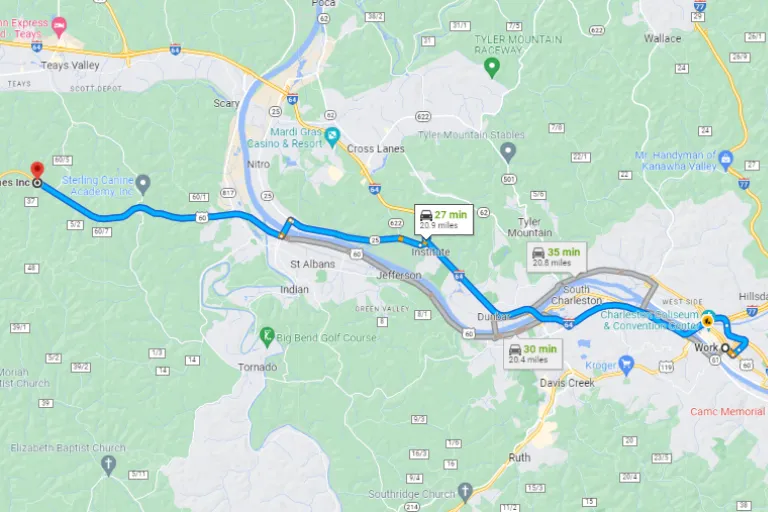Visit us: Mon - Fri: 9:00 - 18:30
Braley Care Homes 6192 US 60 Hurricane, WV 25526
History of Charleston
West Virgnia
History of Huntington
West Virgnia
Want to get to know more about Charleston WV ?
We can take a look at Charleston West Virginia's History.
Let's find out how this beautiful place came to be .
And it's very near Braley Care Homes that's located in Hurricane, WV, too.

History Of Charleston West Virginia
The settlement developed on land purchased by Colonel George Clendenin in 1787; the patent for the land was signed by then governor Thomas Jefferson. Clendenin built Fort Lee there in 1788, and the town was chartered in 1794; first named Charles Town, for Clendenin’s father, it was renamed Charleston in 1819. Because it lay on the migration route to the Ohio River valley, the settlement soon became a transshipment point and attracted such frontier figures as Daniel Boone, Simon Kenton, and Ann Bailey. The town utilized local brine wells as early as 1795 and was an important centre of salt production in 1824, when the first steamboat arrived.
During the American Civil War, Union general Joseph A.J. Lightburn was forced back to Charleston from Fayetteville to the southeast on September 11, 1862. Two days later Confederate general William Loring defeated Lightburn there and occupied Charleston for almost two months. Confederate forces took salt supplies and other goods from the Kanawha River valley, destroying most of the saltworks as they departed. Charleston was nominated as the state capital in 1870, but it took seven years and a popular vote before the capital moved there permanently.
Charleston, county seat of Kanawha County and capital of West Virginia , is located about 255 miles west of Washington, D.C. on the Kanawha River, a tributary of the Ohio River. The Kanawha is navigable and is joined by the Elk River near the center of the city. Until the Civil War, West Virginia was part of the state of Virginia. Col. George Clendenin built Fort Lee on the present site of Charleston in 1788. The name honored Governor Henry Lee of Virginia. The fort served as protection for the settlers, whose encroachments on Indian hunting areas provoked stiff resistance. When Kanawha County was formed in 1791, the citizens sent Daniel Boone, who fished and trapped in the Kanawha Valley, to the Virginia Legislature to represent them. The legislature granted a charter to the community in 1794 under the name Charles Town, after Col. Clendenin’s father, but that was shortened to Charleston in 1818.
History Of Huntington West Virginia
In 1837 Marshall Academy, the forerunner of Marshall University, was created in the town of Barboursville. Named after U.S. Supreme Court Chief Justice John Marshall, it started as a subscription school, and after being closed during the Civil War it reopened as the State Normal School of Marshall College to train teachers. Inhabitants of Cabell County during the Civil War were divided about their allegiances. The Border Rangers were a local pro-South militia formed in 1860, but the county’s representative to the Virginia secession convention of 1861 voted to
remain in the Union.
While Virginia seceded, Cabell County voted to stay in the Union, with the exception of the town of Guyandotte, now part of Huntington. The Battle at Barboursville in 1861 was the first battle in the county, won by the Confederacy. The town was eventually captured by Union forces, which then burned most of Guyandotte to the ground. It was due to the area’s Union leanings that caused the State of West Virginia to be created in 1862.
Huntington, originally called Halderby’s Landing, was named after Collis P. Huntington, a railroad baron who was a major partner in the Central Pacific Railroad, and who bought out the Chesapeake & Ohio Railway. In 1869 he began construction of the western terminus to the C & O, connecting the Ohio River and trains from the Midwest to the Atlantic Seaboard. The city was incorporated in 1871 by the West Virginia State Legislature. In 1873, the first locomotive arrived from Richmond to the celebration of the entire community. The railroad was the city’s largest employer for a century, until eventually becoming part of CSX in the 1970s.
Source: http://www.city-data.com/us-cities/The-South/Huntington-History.html
Timeline of Charleston, West Virginia
The following is a timeline of the history of the city of Charleston, West Virginia, USA.

Prior to 20th century
1794 – Virginia “General Assembly designated 40-acres of George Clendenin’s land, as Charlestown.”
1805 – “Salt-tub mill” begins operating.
1808 –Farmers’ Repository newspaper begins publication.
1815 – Ruffner Mansion built.
1818 – Charlestown renamed “Charleston.” Mercer Academy established.
1819 –Spectator newspaper begins publication.
1841 – Kanawha Lyceum active (approximate date).
1850 – Population: 1,050.
1861 – Jacob Goshorn elected mayor.
1862 – Battle of Charleston fought near town during the American Civil War.
1863 – June 20: Charleston becomes part of new U.S. state of West Virginia.
1870 –City of Charleston incorporated. Charleston designated West Virginia State Capitol.
1872 –Kanawha Chronicle newspaper begins publication.
1875 – State Capitol moves from Charleston to Wheeling.
1884 – James Hall Huling becomes mayor.
1885 –State Capitol moves from Wheeling back to Charleston. State Capitol building expanded.
1890 –West Virginia Historical and Antiquarian Society headquartered in Charleston.
Population: 6,742.
1891 –Burlew Opera House in business. West Virginia Colored Institute founded near Charleston.
1892 – Capitol City Commercial College founded.
1897 – Sacred Heart Church built.
1900 – Chamber of Commerce organized.
20th century
1905 – State Bureau of Archives and History headquartered in Charleston.
1906 – Mason School of Music founded.
1909 – Charleston Public Library opens. Stalnaker Drugstore in business.
1910 – Population: 22,996.
1913 – Chemical manufactory begins operating.
1916 – Libbey-Owens-Ford glass manufactory and Charleston High School built.
1917 – Owens Bottle Company manufactory in business in Kanawha City.
1919 – Town of South Charleston incorporated near Charleston.
1920 –Charleston Daily Mail newspaper in publication.
1921 – Charleston City Hall built.
1922 – Kearse Theater in business.
1923 – Sacred Heart High School established.
1925 – West Virginia Governor’s Mansion built.
1927WCHS radio begins broadcasting. Garnett Library (public library branch) opens. Union Carbide manufacturer buys Blaine Island in South Charleston, near city of Charleston.
1929 – Charleston Municipal Airport established.
1930 – Population: 60,408.
1932 – State Capitol building rebuilt.
1934 – Kanawha County Public Library established.
1935 – Morris Harvey College relocates to Charleston.
1939Charleston Municipal Auditorium built. State Theatre in business.
1940 – Stonewall Jackson High School built.
1941 –Kanawha Boulevard constructed (approximate date).
1947 – Kanawha Airport begins operating.
1959 – Charleston Civic Center opens.
1960 – Population: 85,796.
1961 –July 19: Kanawha River flood. Sunrise Art Museum established.
1971 – John G. Hutchinson becomes mayor.1978 – Morris Harvey College renamed University of Charleston.
1983 – Charleston Town Center shopping mall in business.1998 – City website online (approximate date).
21st century
2001 –Shelley Moore Capito becomes U.S. representative for West Virginia’s 2nd congressional district.
2003 –Clay Center for the Arts and Sciences of West Virginia opens. Danny Jones becomes mayor.
2010 – Population: 51,400.2015Charleston Gazette-Mail newspaper in publication. Alex Mooney becomes U.S. representative for West Virginia’s 2nd congressional district.
Here's a video from The Local Palate which gives us idea about the food and things you can do while in Charleston.
Timeline of Huntington, West Virginia
The following is a timeline of the history of the city of Huntington, West Virginia, USA.

Prior to 20th century
1794 – Virginia “General Assembly designated 40-acres of George Clendenin’s land, as Charlestown.”
1805 – “Salt-tub mill” begins operating.
1808 –Farmers’ Repository newspaper begins publication.
1815 – Ruffner Mansion built.
1818 – Charlestown renamed “Charleston.” Mercer Academy established.
1819 –Spectator newspaper begins publication.
1841 – Kanawha Lyceum active (approximate date).
1850 – Population: 1,050.
1861 – Jacob Goshorn elected mayor.
1862 – Battle of Charleston fought near town during the American Civil War.
1863 – June 20: Charleston becomes part of new U.S. state of West Virginia.
1870 –City of Charleston incorporated. Charleston designated West Virginia State Capitol.
1872 –Kanawha Chronicle newspaper begins publication.
1875 – State Capitol moves from Charleston to Wheeling.
1884 – James Hall Huling becomes mayor.
1885 –State Capitol moves from Wheeling back to Charleston. State Capitol building expanded.
1890 –West Virginia Historical and Antiquarian Society headquartered in Charleston.
Population: 6,742.
1891 –Burlew Opera House in business. West Virginia Colored Institute founded near Charleston.
1892 – Capitol City Commercial College founded.
1897 – Sacred Heart Church built.
1900 – Chamber of Commerce organized.
20th century
1905 – State Bureau of Archives and History headquartered in Charleston.
1906 – Mason School of Music founded.
1909 – Charleston Public Library opens. Stalnaker Drugstore in business.
1910 – Population: 22,996.
1913 – Chemical manufactory begins operating.
1916 – Libbey-Owens-Ford glass manufactory and Charleston High School built.
1917 – Owens Bottle Company manufactory in business in Kanawha City.
1919 – Town of South Charleston incorporated near Charleston.
1920 –Charleston Daily Mail newspaper in publication.
1921 – Charleston City Hall built.
1922 – Kearse Theater in business.
1923 – Sacred Heart High School established.
1925 – West Virginia Governor’s Mansion built.
1927WCHS radio begins broadcasting. Garnett Library (public library branch) opens. Union Carbide manufacturer buys Blaine Island in South Charleston, near city of Charleston.
1929 – Charleston Municipal Airport established.
1930 – Population: 60,408.
1932 – State Capitol building rebuilt.
1934 – Kanawha County Public Library established.
1935 – Morris Harvey College relocates to Charleston.
1939Charleston Municipal Auditorium built. State Theatre in business.
1940 – Stonewall Jackson High School built.
1941 –Kanawha Boulevard constructed (approximate date).
1947 – Kanawha Airport begins operating.
1959 – Charleston Civic Center opens.
1960 – Population: 85,796.
1961 –July 19: Kanawha River flood. Sunrise Art Museum established.
1971 – John G. Hutchinson becomes mayor.1978 – Morris Harvey College renamed University of Charleston.
1983 – Charleston Town Center shopping mall in business.1998 – City website online (approximate date).
21st century
2001 –Shelley Moore Capito becomes U.S. representative for West Virginia’s 2nd congressional district.
2003 –Clay Center for the Arts and Sciences of West Virginia opens. Danny Jones becomes mayor.
2010 – Population: 51,400.2015 Charleston Gazette-Mail newspaper in publication. Alex Mooney becomes U.S. representative for West Virginia’s 2nd congressional district.
Here's a video from The Local Palate which gives us idea about the food and things you can do while in Charleston.
Contact Us to Schedule a Tour!
Contact Us to
Schedule a Tour!
CONTACT US
Location:
Braley Care Homes
6192 US-60
Hurricane, WV 25526
Phone Numbers:
Referrals and Inquiries: (304) 767-4033
Facility Phone: (304) 201-3677
Facility Fax: (304) 201-3678
AREAS WE SERVE
BUSINESS HOURS
Monday
9:00am – 6:30pm
Tuesday
9:00am – 6:30pm
Wednesday
9:00am – 6:30pm
Thursday
9:00am – 6:30pm
Friday
9:00am – 6:30pm

Our clinic largest private mental health partnership, with a carefully selected nationwide team of Psychiatrists.
KEEP IN TOUCH.
CONTACT US
Location:
Braley Care Homes
6192 US 60
Hurricane, WV 25526
Phone Numbers:
Referrals and Inquiries: (304) 767-4033
Facility Phone: (304) 201-3677
Facility Fax: (304) 201-3678
AREAS WE SERVE
BUSINESS HOURS
Monday
9:00am – 6:30pm
Tuesday
9:00am – 6:30pm
Wednesday
9:00am – 6:30pm
Thursday
9:00am – 6:30pm
Friday
9:00am – 6:30pm



